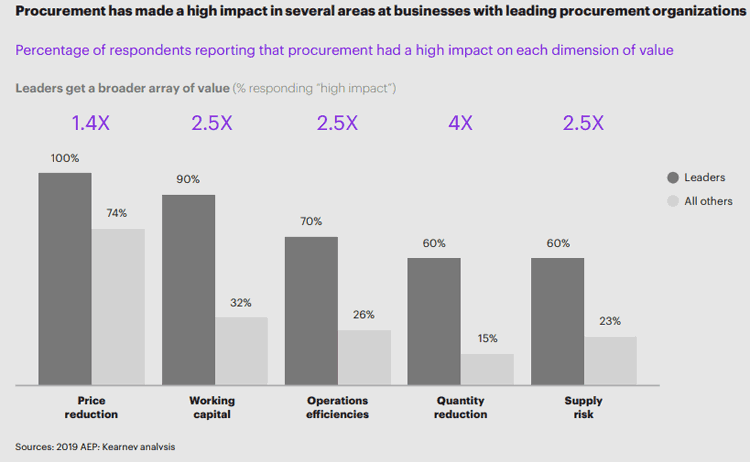The consultants at AT Kearney are back with their annual look at the benefits of procurement excellence, using a framework they call the Return on Supply Management Assets (ROSMA) score.
Supply Chain Digest Says... |
 |
| 90% of procurement leaders with thought to have had a high impact on working capital performance, versus a low 32% for all others. |
 |
What do you say? |
| Click here to send us your comments |
 |
| Click here to see reader feedback |
|
|
Kearney notes the financial stakes are high, with at least 50% of a manufacturing company's costs usually comprised of external spend with suppliers. In fact, Kearney says improving procurement is "a company's biggest opportunity to transform business performance."
And as always, Kearney's research finds substantial differences across companies in terms of that procurement performance, such that top quartile procurement performers have ROSMA scores two to three times higher than those in the middle two quartiles – meaning their ROI on procurement investment is substantially higher.
And the benefits of top quartile procurement performance go beyond just cost savings, Kearney says, with company's more consistently able to meet corporate goals through better integration of procurement with various company stakeholders.
A survey associated with this year's ROSMA analysis supports Kearney's position. Based on a bundle of procurement metrics, the research separates a group of procurement leaders – the top 7% - and then compares results for that group with everyone else in the survey across a variety of performance categories.
As shown in the graphic below, for example, 100% of the small group of procurement leaders said procurement in their companies had a high impact on reducing prices, versus 74% for all others.

Similarly, 90% of procurement leaders were thought to have had a high impact on working capital performance, versus a low 32% for all others. There are similar results for other areas of performance.
(See More Below)
|
CATEGORY SPONSOR: SOFTEON |
|
|
| |
|
|
Kearney says procurement leaders separate themselves from the pack in three main areas:
Procurement Team Excellence: Procurement leaders see themselves as strategic business partners to their various stakeholders, Kearney says – and are especially aligned with the CFO.
In that role, they go beyond just reducing costs to also identify trends and new drivers of business value.
"CPOs get fired for not delivering high-impact cost reduction, and promoted if they deliver strategic value that goes beyond cost reduction," one roundtable participant told Kearney.
Procurement Category Excellence: Procurement leaders are more than twice as likely as others to have robust, long-term category strategies in place, Kearney says, taking a multi-year view.
Leaders use more advanced analytics than do the rest, who are still mostly reliant on spreadsheets. Kearney also says virtually all leaders have direct visibility to at least 80% of total company procurement spend, versus about 50% of spend on average for the rest of the pack.
Supplier Excellence: This is the largest untapped opportunity for performance improvement, Kearney says. It adds that "Leading companies have a defined supply relationship management (SRM) process and team accountability that allow the full supplier lifecycle to be monetized."
Leaders also are likely to have more structured approaches to collaboration with suppliers as well as risk management, Kearney says.
All that said, Kearney says while most procurement executives see themselves as peers with other company functional leaders, CFOs often disagree, seeing procurement as a transactional function that is primarily useful for negotiating hard savings.
Any reaction to this Kearney data and insight? Let us know your thoughts at the Feedback section below.
Your Comments/Feedback
|
|
Tom Miralia
President and CEO, Distribution Technology |
Posted on: Jan, 29 2020 |
|
My experience aligns extremely well with what Potgieter is asserting!
When it comes to contracting for warehouse logistics services, I can show that procument driven RFP's generally fall far short of a 'best practice' given they way they are managed.
We have methods and strategies we offer our prospects that are far more effective more often, and yet so often they are ignored due to the fact that procurement has its own set methods which stand in the way?
I understand that in many cases larger firms utilize procument staff to ensure corporate ethics and consistancy, to serve as a resource in support of operations leadership, and yes, to apply 'pressure' through 'competitive approaches'. The shortcoming in the approach I believe is that the scorecard for the procurement manager typically lacks balance, and then the operating team is left to deal with a supplier working to recover from a 'bruising' negotiation process that's often sows latent defects in the relationship that have to be 'fixed on the backend'! Is this on target?
A better way is to 'walk together'- like setting a budget range up front as mentioned, and sharing work scope and contract terms early in the conversation (once its apparent a supplier is qualified as a prospective solution provider). Solid strategies exist to arrive at the supplier's 'best price' right up front as part of the process, and do it efficiently and gracefully in an atmosphere of mutual trust- you know, a 'win-win' relationship that is more likely to prove more sustainable and just, as if not more, cost effective!
Or it can be done like a commoditized process similar to everyone else's, and suppliers will play a game like everyone else too, hedging pricing and risks as also mentioned above which seems a truly lackluster practice? Is it ok to be satisfied to be like everyone else? I for one am committed to something better, if permitted.
Procurement teams that have cracked this code, those can that promote 'walking together' (with suppliers that have the culture for it) through an RFP will acomplish higher levels of effectiveness on behalf of their organizations. It's just a better way.
Makes sense?
|
|
|